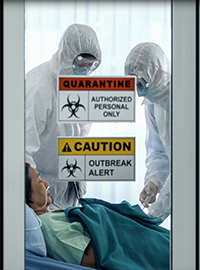| Public Health Officials Conceal Hospital Infection Outbreaks |
 |
|
By Betsy McCaughey
Wednesday, July 28 2021 |
Public health officials struggle with telling the truth. They seem to think people don't deserve to know. At the beginning of COVID-19, they told us we didn't need masks instead of admitting there was a mask shortage. Last week, health officials announced outbreaks of a hospital infection that's highly contagious and untreatable by any medication. One-third of patients who get it die within 30 days. You wouldn't want to be in a hospital overrun with this germ. Here's the catch: The federal Centers for Disease Control and Prevention is hiding which hospitals and nursing homes have it. The agency seems to think it's OK to keep the public in the dark to protect these businesses. The public wouldn't tolerate officials concealing which restaurant has a food poisoning outbreak or which airline is involved in a crash. Yet we're supposed to go along with the CDC and state health officials when they cater to nursing homes and hospitals that demand secrecy. Do these health officials work for the public or the health care industry? The germ, Candida auris, won't knock you over on the street. The threat is inside health care facilities because you don't want to be treated in a hospital after a patient who had it. This germ clings to privacy curtains, blood pressure cuffs, thermometers and even walls and ceilings. Then, it strikes, adhering to patients' skin before invading their bloodstream and organs. It's a "catastrophic threat," said Anne Schuchat, newly retired deputy director of the CDC. Candida auris is just one of at least two dozen germs – some bacterial and others fungal – that are becoming unresponsive to medications. With untreatable infections lurking, going into a hospital or nursing home becomes increasingly dangerous. You could contract something far worse than what you came in with. New York health care facilities are ground zero for Candida auris, but state health officials have done their best to cloak the problem in secrecy. Only once, in November 2019, did they relent to public pressure and release a list of the 64 hospitals and 103 nursing homes struggling with the germ. But that was then. The state has given the public no information on the whereabouts of Candida auris or the other health care infections since 2019, which is not much help if you're planning a hospital stay or choosing a nursing home for a loved one. Secrecy is a problem everywhere. When an outbreak of MRSA (a drug-resistant staph) raged through the neonatal intensive care unit at UC Irvine Medical Center, which infected 10 newborns, the hospital and public health officials kept it mum until a hospital employee leaked the information. Imagine going to the hospital to give birth only to find out about a superbug outbreak in the nursery. Since the pandemic, Candida auris has exploded by at least 400% with hospital staffs stretched and spaces crowded. Good luck finding out if your hospital is struggling with it. Many other superbug infections are also on the rise in hospitals. The deaths from Candida auris at the unnamed hospital and nursing homes in Texas and Washington, D.C., made headlines last week for one reason: For the first time, this germ resisted all three anti-fungal medications, leaving nothing in the doctor's toolbox. That's an ominous sign that germs are winning the race against the pharmaceutical innovators. But there is another remedy: cleanliness. It will keep the germ from ever getting into the patient's body. Hospitals that double down on disinfection, hand washing and infection prevention steps can halt an outbreak. When Candida auris invaded Scripps Memorial Hospital in La Jolla, California, the staff beat it largely by thoroughly cleaning rooms twice daily. Too bad that public health officials, from the CDC on down, pander to hospital and nursing home executives rather than making them clean up their facilities and come clean about their outbreaks. In many cities, restaurants are graded for cleanliness and have to post the grade. If a salmonella outbreak is traced to a restaurant, the world hears about it. That's what needs to be done with hospitals. Betsy McCaughey is a former lieutenant governor of New York and author of "The Next Pandemic," available at Amazon.com. COPYRIGHT 2021 CREATORS.COM |
Related Articles : |
























